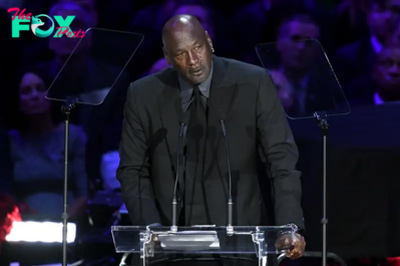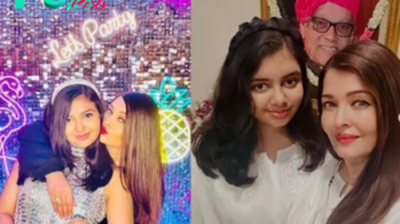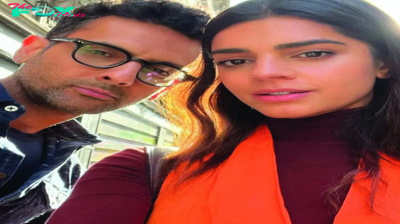Lifestyle
What's in a hook? | The Express Tribune
Bollywood is riding a fresh wave of nostalgia. Earlier this year, the comedy-drama Crew, starring Kareena Kapoor Khan, Tabu, and Kriti Sanon, featured a high-energy remix of Choli Ke Peeche. Sanon, having a strong 2024, also starred in Teri Baaton Mein Aisa Uljha Jiya, a sci-fi comedy with a title track based on Canadian singer Raghav's 2004 hit.
Recently, she appeared alongside Kajol in Do Patti, another lacklustre 2024 title that reworks a classic. While Sanon likely isn't intentionally chasing past successes, her recent roles tap into a broader trend of leveraging sonic and star-powered nostalgia from a bygone era.
Through proper channels
Do Patti recruits Shilpa Rao to produce its own version of Reshma's celebrated melody Akhiyaan Nu Rehn De. Rao's vocals are characteristic and soulful, even if bordering time-worn, as she sings the famous refrain with calculated abandon. Those familiar with Reshma's magic will be in for a disappointment and it has little to do with Rao's execution. Few, and that includes the Indian singer at her best, can replicate the meditative yearning of the original even if the chorus is all that is borrowed.
With over 12 million views on YouTube, the comment section is mostly dominated by praise. However, the outrage is more pronounced on Pakistani internet, where many mourn the Indian version Akhiyaan De Kol as another unsolicited use of cultural property. "Bollywood ruined our song" is a common sentiment across Instagram pages reporting on the remake. "It's not like it's the first time. They have always been copying our songs." Some have countered the online backlash by appreciating the proper attribution given to the original creators.
"There's a difference between copying and being licenced through a label," remarks one Instagram user. Indeed, a section under the YouTube video is dedicated to the original credits, recognising Reshma as the singer, along with the other artists responsible for the lyrics and music.
To further discuss credits and royalties, The Express Tribune reached out to COO EMI Zeeshan Chaudhry. "Technically, there is no controversy. Likes and dislikes are very subjective and another matter altogether. As far as T-Series' remake is concerned, they have given due credit to the original creators and EMI Pakistan as its publisher."
EMI has previously licenced songs to platforms like Coke Studio and Battle of Bands, which have elicited mixed reactions. "It's not even the complete song. They sampled the punchline and made the rest of the song themselves," Chaudhry added.
About tradition and ritual value
There is something unsettling about Akhiyaan De Kol even when it's in the legal clear.
"It's nothing short of artistic corruption," remarked Sharif Awan, founder of the Tehzeeb Foundation, to The Express Tribune. Awan, a writer, revivalist, and curator of Pakistan's classical, folk, and world music, has led his organisation in extensive efforts to archive the country's classical heritage.
He added, "Intellectual property rights are important, yes. But my concern is beyond that. Today's music scene is increasingly dominated by the reuse of existing art for immediate and ordinary gains." The debate over creative lethargy centres on whether it stems from a refusal or an inability to explore new directions. What's clear, however, is that for those like Awan, who are deeply familiar with indigenous music traditions, ownership is secondary. What's truly at stake is the ritual value, pessimistically at odds with the market.
"This is like corrupting a centuries-old raag's bandish, whether or not someone is there to claim it. In various South Asian music traditions, it is considered blasphemous to treat a musical composition in such a trivial manner by altering it for a quick hit. And the blame for this falls on these big music gurus in India and Pakistan."
In the music video, Sanon dons a red latex, body-hugging dress as Rao's voice mellows into a pedestrian call-out of a ruthless lover. Some might court the blue-red saturated palette and fast-paced editing as markers of high production value. Old-school enthusiasts, on the other hand, may accuse the over-polished execution of stripping away its intended rawness.
The rise of reel music
The issue isn't simply that the chorus from Reshma's original sandwiches some of the most vapid lyricism about the painful vulnerability of love. Do Patti's take is more troublingly symptomatic of a growing trend in music that hinges solely on a catchy hook.
Let's call this reel music. As the name indicates, a song falling in this genre is compelled to average twenty to thirty seconds of dopamine, roughly the same span social media platforms allow for background music. Verse-chorus-verse-chorus-bridge-chorus-chorus is the usual formula of a pop song. But reel music finds the pulse of the algorithm and grabs a hammer.
"Why do I keep hitting myself with a hammer? Because it feels so good when I stop" is how the saying goes and one way to describe the listening experience of reel music. Like the persistent hitting of a hammer, every section of these songs is spent waiting for the torment-slash-tedium to cease and for the chorus to kick in. Of course, Instagram and TikTok often remove the hitting from the equation altogether by readily recommending viral hooks to attach to reels. Relief without suffering is as good as it gets.
In more practical terms, the way reel music capitalises on hooks or choruses is far less morbid and therefore, widely common. Away from India, Sabrina Carpenter's newfound fame comes after having spent an unremarkable decade in the field. Upon its release, Please Please Please was immediately absorbed by the algorithm, as was Taste. Her most famous song is perhaps Espresso, which is both a structural anomaly in mainstream pop (it begins with the chorus) and has an equally popular verse ("I'm working late 'cause I'm a singer").
Even if Carpenter did not mean to lean into the internet's formula for successful music, Espresso cannot resist getting the hook treatment in the welter of reels. Aside from Carpenter, Addison Rae's Diet Pepsi, Chappell Roan's Good Luck, Babe! and Tate McRae's Greedy are other recent hits trending for the same reasons.
On the wild side
From Sadqay to a number of Coke Studio Pakistan offerings, increasingly from the last three seasons, reel music has installed itself as a lucrative shortcut at home as well. But what does it mean for a classic folk song to be turned into a generic hook-driven techno beat?
All Bollywood took from Reshma may be the chorus, but in the current music and attention economy it's also all anyone is listening forinadvertently or otherwise. Many defenders of the remake might interpret this as a critique of sampling. Listeners of hip-hop and EDM especially have every right to defend sampling as a standard practice, not inherently at odds with creativity.
Sampling, when done right, can bridge musical eras and styles, infusing new work with a respectful nod to its origins. Kanye West's Power borrows the grit of King Crimson's 21st Century Schizoid Man; Mac Miller's The Spins takes Empire of the Sun's laid-back Half Mast and turns it into an upbeat celebration. Meanwhile, A Tribe Called Quest's Can I Kick It taps into the legendary bassline of Lou Reed's Walk on the Wild Side, giving it a groove that's both chill and socially conscious.
Bollywood also has an old affinity for remixes. Those from the right generation will remember Sona Mahapatra's reimagining of Shamshad Begum's modest Kabhi Aar Kabhi Paar. One can only imagine the outrage over replacing Guru Dutt and Shyama's innocent flirtations with an unabashedly sexualised schoolgirl fantasy. Kabhi Aar Kabhi Paar is one of the many songs from the 2000s Indian music scene to modify golden hits with faster club beats, synthesised basslines, percussion layers, harmonised chants, and EDM drops.
Much like Akhiyaan De Kol, Mahapatra's remix may swing between accusations of 'ruining' or 'disrespecting' a classic, but it escapes the dreaded question, "Was this really necessary?" For one thing those low-production yet insanely catchy trap remixes got right was that they were still making music, not hacking the algorithm.
-

 Lifestyle3h ago
Lifestyle3h agoFans react after single Kim Kardashian hangs out with $30K Tesla robot: Low-maintenance boyfriend.cau
-

 Lifestyle3h ago
Lifestyle3h agoElon Musk: 53-Year-Old Welcomes Twelfth Member to His Growing Family and Everyone Says So.cau
-

 Lifestyle4h ago
Lifestyle4h agoGREAT FOOD HALL debuts “Food x Art” concept for 25th anniversary celebrations
-

 Lifestyle9h ago
Lifestyle9h agoRevealing the Story of the Legendary Michael Jordan: At 21, He Bought 7 Supercars in One Day and Gave Away 6 for Just One Reason.Linh
-

 Lifestyle9h ago
Lifestyle9h agoExplore Justin Bieber’s Lavish Lifestyle and Vast Fortune at the Age of 29.Linh
-

 Lifestyle14h ago
Lifestyle14h ago“BREAKING: ABC CEO Announces Plans to Ax The View—‘It’s Just the Worst Show on TV!’”.Ngocchau
-

 Lifestyle14h ago
Lifestyle14h agoBREAKING NEWS: Keenan Reeves Stands by Katt Williams and Uncovers the Dark Truth About Oprah – Shocking Revelations Exposed.Ngocchau
-

 Lifestyle20h ago
Lifestyle20h agoUNHAPPY KELCE: Travis Kelce Vents Fury Over Chiefs’ First Loss, ‘It Pisses Me Off.’Cau



























